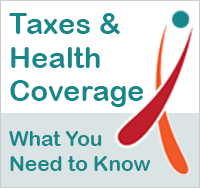
The Federal Income Tax Filing Deadline is April 18, 2023
Ryan White HIV/AIDS Program (RWHAP) clients should be sure to file their federal taxes, or request an extension, by April 18, 2023.
Taxes and Health Coverage: This ACE TA Center tool helps consumers to understand the relationship between health coverage and taxes. It also outlines how to reconcile advance premium tax credits through tax filing. Also available in Spanish/en Espanol and Haitian Creol/an kreyol ayisyen.
Relationship Between Taxes and Health Coverage
While the relationship between taxes and health coverage can be confusing, it is an important one to understand. As we head into tax season, it’s important for staff and clients to know not just what needs to be done, but why.
Taxes and health coverage are connected in two important ways:
- Providing proof of health coverage where it is required.
- Reconciling under- or over-paid premium tax credits for individuals who had Marketplace health coverage.
Proof of Health Coverage
The federal individual mandate was eliminated beginning in 2019, meaning individuals are no longer required to prove they had health insurance when they file their federal income taxes. If a client did not have health coverage in 2022, they will not be penalized by the federal government when they go to file their 2022 taxes this season. Some states - including California, D.C., Massachusetts, New Jersey, Rhode Island, and Vermont - have implemented their own individual health insurance mandates for their residents, and may charge uninsured residents a penalty on their state taxes.
Reconciling Tax Credits
Through the Marketplace, there are two types of financial assistance available to eligible individuals that can help cover health insurance costs for plans purchased on the Marketplace, Premium Tax Credits (PTCs) and Cost-Sharing Reductions (CSRs).
A Premium Tax Credit (PTC) is a subsidy that helps lower the cost of premiums for health coverage purchased through the Health Insurance Marketplace. Advance payments of the premium tax credit (called Advance Premium Tax Credits, or APTCs) can be used immediately to lower monthly premium costs.
- Clients must file a federal income tax return after the end of the year regardless of whether they received the premium tax credit in advance or plan to claim it as a lump sum. The client will then use the return to reconcile the difference between the APTC payments and the actual amount of the credit that the client is eligible for at the end of the year.
- If the PTC amount that a person received is different from the amount that they actually qualified for, the difference will be reconciled when they file their taxes. They may owe or be refunded money when they file their federal taxes.
- In past years, not filing taxes could make a person ineligible for tax credits the following year. However in July 2022, CMS announced that it will not enforce this “failure to reconcile” policy for plan year 2023. This is a one-year extension to the protections that have been in place since plan year 2021.
- The requirement that all individuals who received APTCs file federal taxes remains in place, even though the enforcement of this requirement is temporarily suspended. We encourage case managers and enrollment assisters to support clients in filing taxes in 2023.
A Cost-Sharing Reduction (CSR) is a discount that lowers the amount individuals and families have to pay out-of-pocket for deductibles, coinsurance, and copayments. CSRs are NOT used to pay premiums.
- There is no relationship between the CSR and filing taxes. This means that there is no reconciliation process for the CSR when an individual files taxes.
Resources to Learn More About PTCs and CSRs
- Understanding Premium Tax Credits and Cost-Sharing Reductions eLearning Module: This eLearning module is a self-paced, interactive tool designed to help RWHAP program staff understand the basics of PTCs and CSRs as well as how they can help RWHAP clients pay for their Marketplace insurance and reduce out-of-pocket costs.
- FAQ: Premium Tax Credits (PTCs) and Cost-Sharing Reductions (CSRs): This Frequently Asked Questions (FAQ) guide provides information about the two main types of financial support available for many consumers who get health coverage through the Marketplace: PTCs and CSRs.
Ensure Clients Have the Following Documents on Hand When Filing Their Taxes
IRS Form 1095-A (Health Insurance Marketplace Statement): Clients do not need to file this form with their taxes, but should keep it for their records and use it to help them complete IRS Form 8962 (Premium Tax Credit).
Income and Tax Information for the Tax Year
- W-2 forms from all employers
- Unique Exemption Certificate Number or ECN if you applied for an exemption from the Marketplace
- Information about any self-employment income
- Unemployment compensation
- Social Security benefits
Information for Each Household Member
- Social security numbers or Individual Taxpayer Identification Number (ITIN)
- Dates of birth
Questions? Email the ACE TA Center.